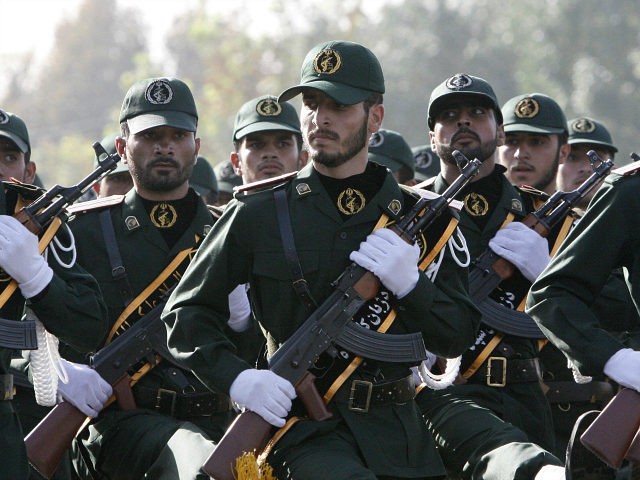Gen. Rasoul Sanayee Raad, deputy commander of the Islamic Revolutionary Guard Corps (IRGC), on Wednesday became the latest Iranian military commander to threaten military action against the United States and confidently predict Iran would emerge victorious from such a conflict.
Raad’s bluster was quoted by Iran’s state-run Fars news service:
“War against Iran will have nothing for the US but heavy costs and the Islamic Republic of Iran’s deterrent power can inflict heavy damage on the US,” General Sanayee Raad said on Wednesday.
He noted that US President Donald Trump does not enjoy the capability to form a consensus and coalition for a war against Iran, and said, “If a war happens today, increased energy prices will inflict heavy expenses on the European states.”
“The US has understood that there will be no ultimate victory in case it opens war against Iran and that it cannot guarantee avoiding it from becoming a war of attrition,” General Sanayee said.
Iran’s threats generally fall into two categories: incendiary vows to crush the United States (and usually Israel) in a regional conflict and more specific threats to shut down or terrorize shipping through the Straits of Hormuz. Although Gen. Raad apparently neglected to threaten Israel, he bridged the two categories of bluster by stressing how much economic damage Iran can inflict on the Western world in any conflict.
Raad’s pointed threat to “inflict heavy expenses on European states” was delivered on the same day his boss, Supreme Leader Ayatollah Ali Khamenei, publicly advised President Hassan Rouhani to stop waiting for Europe to rescue Iran from U.S. sanctions.
“There is no problem with negotiations and keeping contact with the Europeans, but you should give up hope on them over economic issues or the nuclear deal,” Khamenei told Rouhani.
“The nuclear deal is a means, not the goal, and if we come to this conclusion that it does not serve our national interests, we can abandon it,” the ayatollah added.
Taken together, Raad and Khamenei’s comments sound like a last-ditch effort to wheedle or threaten help from Europe before the second, far more intense round of U.S. sanctions takes effect on November 4.
They could also be running a power play against Rouhani, who is the chief executive of a secular government subordinate to Khamenei’s religious hierarchy. The Islamic Revolutionary Guard Corps, whose officers are generally the source of threatening comments, is loyal to the theocracy.
Rouhani has been having a rough time in the parliament of late. His labor minister was sacked by the legislature three weeks ago, his economy minister was impeached on Sunday, and on Tuesday, parliament formally voted to reject Rouhani’s explanations for the miserable Iranian economy after grilling him for two hours on live television.
One interpretation of these events is that the “hardliners” are taking power from the “moderate” reformer Rouhani, father of the nuclear deal. This interpretation supposes the “moderates” were every really in charge.
The favorite illusion of President Barack Obama’s foreign policy was the unshakeable belief that Rouhani and his moderate supporters were poised to take over, liberalize Iran, and join the world community as responsible citizens. Most mainstream media coverage is still written from the perspective of this theory, so President Obama’s successor Donald Trump supposedly made a terrible blunder by pulling out of the nuclear deal and kneecapping the moderates.
The problem with this interpretation is that very little evidence exists of Iran liberalizing under the nuclear deal — on the contrary, it has grown even more repressive and invested its nuclear deal windfall in spreading its malign influence across the Middle East.
That is precisely what the demonstrators thronging the streets of Iran during increasingly large protest movements are angry about: the nation’s wealth was squandered on guns for Hezbollah, Syria, and the Houthis of Yemen instead of bread and butter for Iranians. When they shout, “Death to the dictator!” they are referring to Ayatollah Khamenei. When they mean death to Rouhani, they shout, “Death to Rouhani!” Parliament explicitly rejected Rouhani’s efforts to blame Iran’s woes on U.S. sanctions Tuesday.
These are not indications of hardliner strength, but signs restored sanctions have weakened the hardliners and disrupted the illusion of moderate ascendancy Iran employed so skillfully to befuddle the Obama administration.
Some observers speculate the current unrest will truly empower moderates because the hardliners have clearly lost control of a protest movement they encouraged because they wanted to take Rouhani down a few pegs.
Another indication of trouble for the regime is that officers in the fanatical theocracy-controlled IRGC cannot stop threatening war with the United States. The great danger is that they will decide belligerent rhetoric is not doing enough to unify the Iranian public, so they will actually take some violent action.

COMMENTS
Please let us know if you're having issues with commenting.